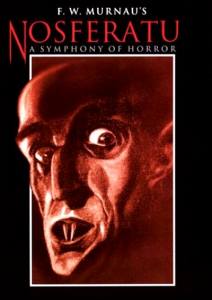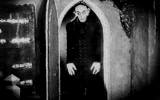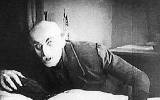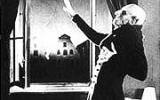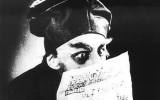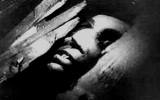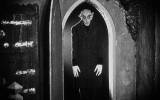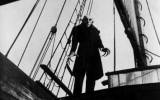
|
Derzeit online |
||
|
386
|
Filme | |
|
125
|
Bücher | |
|
34
|
Biographien | |
|
50
|
Hörspiele | |
|
|
||

![]()
| Nosferatu
(OT: Nosferatu - Eine Symphonie des Grauens) AKA: Nosferatu the Vampire, Nosferatu, a Symphony of Terror, Nosferatu, a Symphony of Horror Nosferatu: The First Vampire, Terror of Dracula
1838: Thomas and Ellen Hutter happily and contentedly live in Bremen. One day, Thomas Hutter is sent to Transsylvania by his boss, the realtor Knock, his mission being to sell a house in Bremen to Count Orlock. At this point, Hutter cannot even imagine the danger to come. The warnings of the people in Transsylvania rather make him smile. The closer he gets to his destination, the less at ease he feels. After a rapid coach trip over steep passes he finally reaches the castle of Count Orlock, who soon turns out to be a fearsome personality. But Hutter doesn't give up and stays as the guest of Orlock. When he cuts his finger during the meal, Nosferatu sucks his wound. When Orlock sees a photograph of Ellen Hutter and hears that "his" real estate was just on the other side of the Hutters house, the sales agreement is concluded quite fast. The next day Hutter discovers two small red wounds on his throat and finds out that he is the prisoner of the Count, whose dark secret he now knows only too well. The next night Orlock sets out to Bremen. Hutter can escape from the castle. On
the sailing-ship Demeter, the freight being the coffin of the count,
all crewmen meet a terrible and mysterious end. The vampire does
his foul work. When he finally reaches his destination, Bremen,
a wave of pestilence erupts. By now, Hutter is also back home. In
his luggage Ellen finds a book on vampirism and sees through the
facts. She manages to keep the vampire in her room throughout the
night and the first sunrays make him turn into dust. Ellen has sacrificed
herself and dies, but pestilence and vampire are defeated and the
town is saved!
This movie is a legend, nearly a myth in itself. It wasn't an authorized film version of Stoker's novel. The framework was stolen impudently and transferred to Bremen. Dracula becomes Orlok, Harker Hutter, etc. Murnau probably wanted to save royalties and he acted in quite the same way when he was making his movie "Der Januskopf", an adaptation of Stevensons "Dr. Jenkyll and Mr. Hyde" two years earlier. The outcome was inevitable: Bram Stokers widow, Florence, sued because of a violation of the copy right and was given justice in all instances. All copies of the movie were to be destroyed and it is a tragedy that this nearly succeeded. Some few copies as well as the original reappeared abroad later. It
is due to this and the fact that in 1930 the dubbed version of the
film with the title "the 12th hour" appeared, that the
original version stayed mostly unknown for quite a while. And we
must say that the original film is a milestone in film history,
being, together with "The Cabinet of Dr. Caligary" (which
was made two years earlier) one of the most important examples of
the German pre-war film era. Being not as expressionistic as Caligari,
"Nosferatu" anticipates quite some elements of the gothic
horror of the 1930s and 1940s. Madness, prophecies of death, hauntings...
all this is presented by Murnau in gloomy mountainsides or on the
stormy sea. And there is one special element, that has a crucial
influence on later film-versions that we owe to Murnau's Nosferatu:
sunlight makes the vampire turn into dust. Whereas in Stokers novel,
daylight only weakens the Vampire, here he dies for good. Well,
that's the way it goes.
|
|||||||||||||||||||||||||||||||||||||||||||||||
|
|||||||||||||||||||||||||||||||||||||||||||||||
